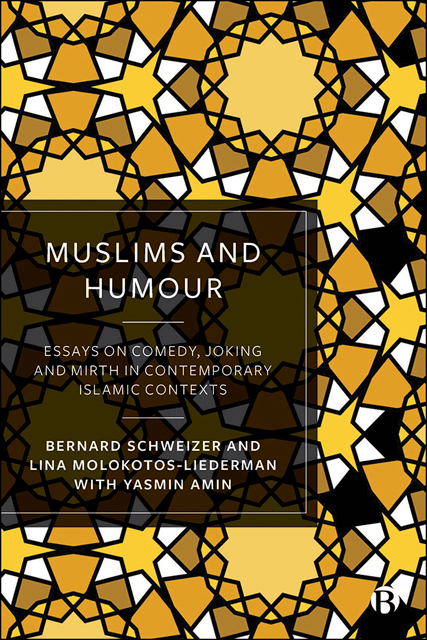Book contents
- Frontmatter
- Contents
- Notes on Contributors
- Acknowledgements
- Introduction
- Part I Theoretical Perspectives on Islam and Humour
- Part II Muslim Humour Practices in Islamicate Societies: Textual Media
- Part III Muslim Humour Practices in Islamicate Societies: Visual Media and Performance
- Part IV Muslim Comedy in North America
- Conclusion
- Bibliography on Islam and Humour
- Index
4 - Using/Abusing the Qur’an in Jocular Literature: Blasphemy, Qur’anophilia, or Familiarity?
Published online by Cambridge University Press: 13 October 2022
- Frontmatter
- Contents
- Notes on Contributors
- Acknowledgements
- Introduction
- Part I Theoretical Perspectives on Islam and Humour
- Part II Muslim Humour Practices in Islamicate Societies: Textual Media
- Part III Muslim Humour Practices in Islamicate Societies: Visual Media and Performance
- Part IV Muslim Comedy in North America
- Conclusion
- Bibliography on Islam and Humour
- Index
Summary
Muslims are nowadays being viewed or stereotyped as humourless. Muslim men with grim faces, bushy eyebrows, and wild, unkempt beards, and women covered from head to toe in black garb, have also become part of the collective media picture. Images of burning flags and besieged embassies in the aftermath of the Danish cartoons published in 2005 were printed over and over again to emphasize the ugly, humourless aspect of Muslims. The shooting in January 2015 of several staff members of the French satirical weekly newspaper Charlie Hebdo, presumably for its controversial cartoons about Prophet Muḥammad, as well as Islamic leaders, also served to highlight this stereotype.
Consequently, an entire civilization and culture is being regarded as devoid of humour and the light touch of laughter, and has been simply encapsulated by those blazing eyes of the fundamentalists and their merciless harshness. However, it is an unreal image completely at odds with the humanity of the Muslim people and the abundant evidence of humour in Arab and Islamic countries for many centuries – evidence which proves not only that Muslims have a sense of humour, but also that many medieval authors were not afraid to use their religious scriptures to create laughs, and these jokes lived on.
Humour is an intelligent way of looking at life. It is also often used to address taboo topics, but it is most certainly not limited to these. Its goal is to expose the paradoxical aspects of life, such as hypocrisy, lies, contradictions, and bad habits. Humour enables people to see a fault and learn to avoid it; to notice virtue and emphasize it. Since medieval times, like any other community, Arabs and Muslims have laughed – and laughed very hard – at their conditions, their rulers, and their religious clerics and their rulings.
Some of the jokes incorporating the Qur’an are borderline irreverent or blasphemous, yet they are found in numerous classical texts, literary works, and anecdotal collections. These jokes provide confirmation that the Muslim community did not shy away from using the Qur’an in numerous ways in their daily lives.
- Type
- Chapter
- Information
- Muslims and HumourEssays on Comedy, Joking, and Mirth in Contemporary Islamic Contexts, pp. 91 - 117Publisher: Bristol University PressPrint publication year: 2022

